|
Vocapedia >
Arts >
Books > Readers
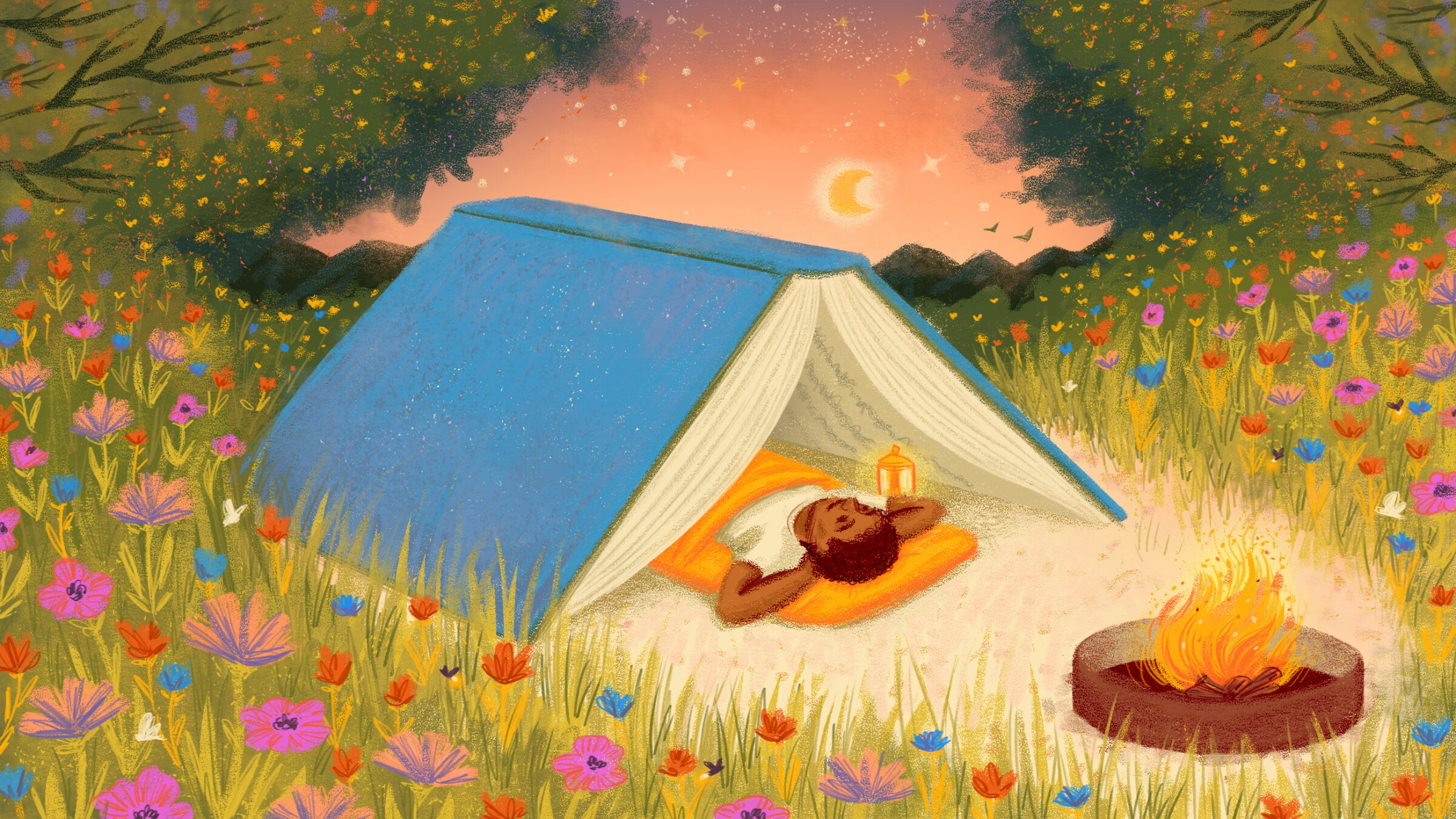
17 new books our critics can't
wait to read this summer
NPR May 21,
2025
Illustration: Jackie Lay
17 new books our critics can't
wait to read this summer
NPR
May 21, 2025
6:00 AM ET
https://www.npr.org/2025/05/21/
nx-s1-5356141/best-new-books-summer-reading

Illustration: Chris Riddell
Neil Gaiman and Chris Riddell
on why we need libraries – an essay in
pictures
Two great champions of reading for pleasure
return to remind us that it really is an
important thing to do
– and that libraries create literate
citizens
G
Thu 6 Sep 2018 16.59 BST
https://www.theguardian.com/books/gallery/2018/sep/06/
neil-gaiman-and-chris-riddell-on-why-we-need-libraries-an-essay-in-pictures

Illustration: Johnny Dombrowski
Can’t Sleep?
Let Stephen King Keep You
Company
NYT
April 19, 2020 5:00 a.m.
ET
https://www.nytimes.com/2020/04/19/
books/review/stephen-king-if-it-bleeds.html
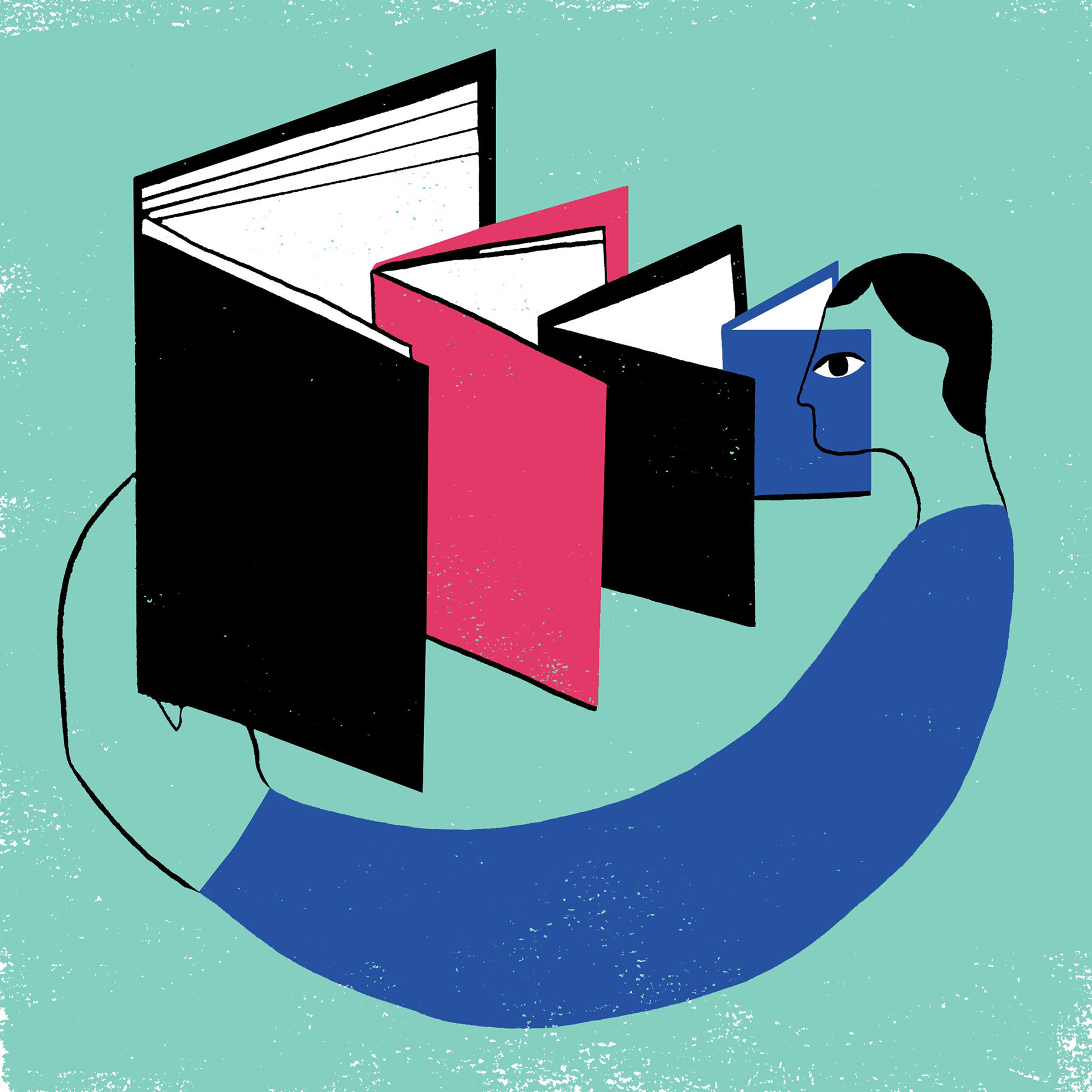
Illustration: Hanna Barczyk
When Reading Had No End
Books were a refuge in 2020,
although some stories were more
of a consolation than others.
NYT
Dec. 9, 2020
https://www.nytimes.com/2020/12/09/
books/reading-pandemic.html

A young
David Bowie (then Davy Jones) in
1965
fitting in his eight books a day.
Photograph: CA/Redferns
Readers recommend: songs about books
G
Thursday 18 June 2015 20.00 BST
Last modified on Wednesday 15 June 2016 08.11 BST
https://www.theguardian.com/music/musicblog/2015/jun/18/
readers-recommend-songs-about-books
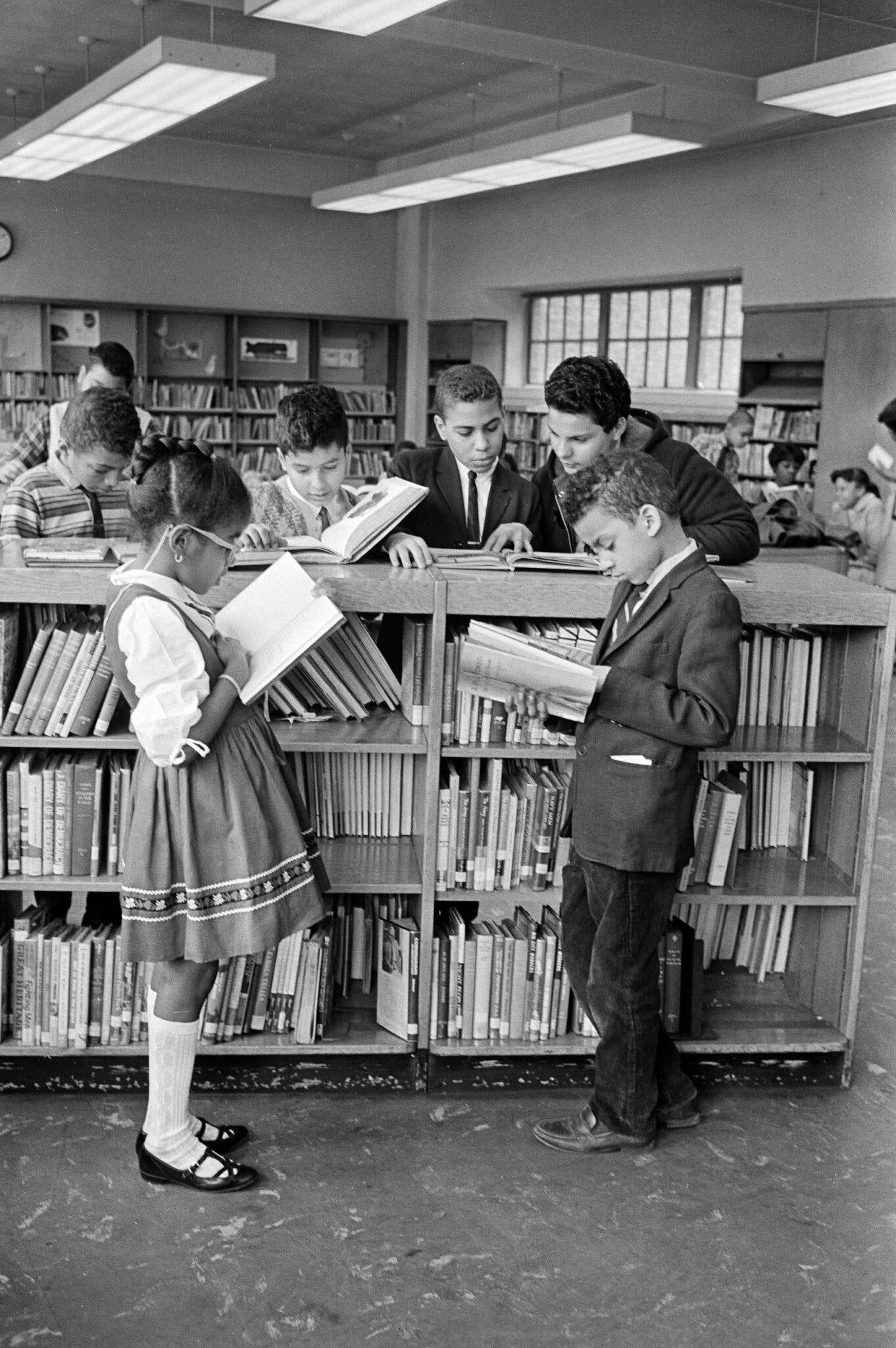
Children reading at the Countee Cullen
Public Library
on 136th Street between Lenox and 7th
Avenues, 1967.
Photograph:
Arthur Brower
The New York Times
Visuals
The Literary Lives of New York City’s Youth
Archival photos of children’s reading rooms
at the New York Public Library over the
years.
NYT
Nov. 10, 2023
https://www.nytimes.com/2023/11/10/
books/review/the-literary-lives-of-new-york-citys-youth.html
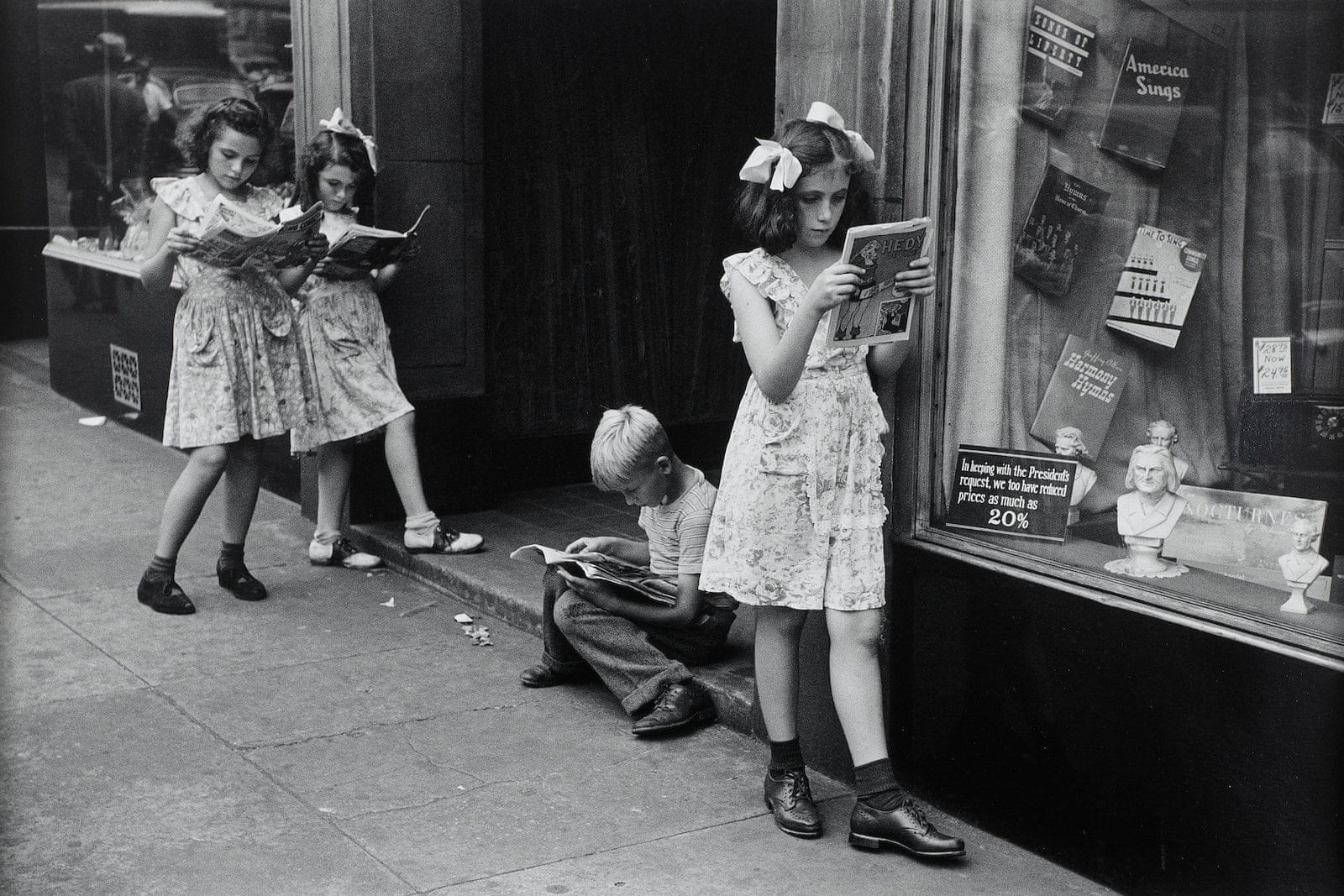
Comic Book Readers, NYC,
1947
In 1940,
Orkin briefly attended Los Angeles City College for
photojournalism
before becoming the first messenger girl at MGM Studios in
1941.
She had hoped to become a cinematographer
but left after discovering that the cinematographers’ union
did not allow female members
American girl behind the camera: the pioneering work of Ruth
Orkin – in pictures
A new auction marks 100 years since the birth of US
photographer Ruth Orkin,
who travelled the world making waves in an industry dominated
by men
G
Tue 12 Jan 2021 07.00 GMT
https://www.theguardian.com/artanddesign/gallery/2021/jan/12/
american-photographer-ruth-orkin-in-pictures

Freshly Squeezed
by Ed Stein
GoComics
June 23, 2013
https://www.gocomics.com/freshlysqueezed/2013/06/23


Readers digest
The Guardian Review
p. 5
30 December 2006
https://www.theguardian.com/books/2006/dec/30/
bestbooksoftheyear.bestbooks
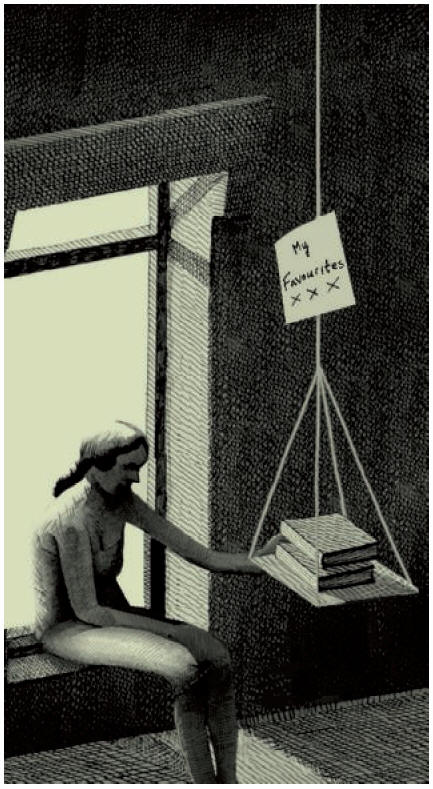
Readers digest
The Guardian Review
p. 6
30
December 2006
https://www.theguardian.com/books/2006/dec/30/
bestbooksoftheyear.bestbooks

Izhar Cohen
Guardian Review p. 3
12 March 2005
read UK
https://www.theguardian.com/books/gallery/2018/sep/06/
neil-gaiman-and-chris-riddell-on-why-we-need-libraries-
an-essay-in-pictures
read
USA
https://www.nytimes.com/2025/07/26/
books/man-died-book-list-thousands.html
https://www.nytimes.com/2025/06/25/
style/fiction-books-men-reading.html
https://www.nytimes.com/2022/12/25/
us/reading-literacy-memphis-tennessee.html
https://www.propublica.org/article/
literacy-adult-education-united-states-solutions - December 23, 2022
https://www.npr.org/2021/10/01/
1041859001/reading-aloud-benefits-childrens-literacy
https://www.npr.org/2021/04/30/
991935818/a-joy-of-reading-sparked-
by-a-special-librarian-determined-to-make-a-difference
https://www.npr.org/2019/12/16/
788399531/kids-books-
to-read-again-and-again-and-again-and-again-and-again-and
https://www.npr.org/2019/11/21/
781673493/how-to-read-more-books
https://www.npr.org/2019/03/15/
700345380/building-teens-into-strong-readers-by-letting-them-teach
https://www.npr.org/2019/01/04/
678645947/his-love-for-books-reads-like-poetry
https://www.npr.org/sections/ed/2018/05/24/
611609366/whats-going-on-in-your-childs-brain-
when-you-read-them-a-story
https://www.npr.org/sections/ed/2018/03/01/
589912466/dolly-parton-gives-the-gift-of-literacy-a-library-of-100-million-books
https://www.nytimes.com/2018/01/17/
technology/personaltech/
how-technology-is-and-isnt-changing-our-reading-habits.html
https://www.npr.org/sections/ed/2016/10/19/
498539751/checking-back-in-on-the-barber-who-encourages-kids-to-read
https://www.npr.org/sections/ed/2016/10/12/
496553810/choose-a-book-and-read-to-your-barber-hell-take-a-little-money-off-the-top
https://www.npr.org/2016/04/17/
474404440/you-can-go-home-again-the-transformative-joy-of-rereading
https://www.npr.org/blogs/ed/2015/03/17/
387774026/q-a-raising-kids-who-want-to-read
https://www.nytimes.com/2014/05/13/
opinion/bruni-read-kids-read.html
read aloud
USA
https://www.npr.org/2021/10/01/
1041859001/reading-aloud-benefits-childrens-literacy
the
right to read
USA
https://www.propublica.org/series/
the-right-to-read
https://www.propublica.org/article/
literacy-adult-education-united-states-solutions - December 23, 2022
read
USA
https://www.npr.org/2024/06/11/
nx-s1-5002183/fiction-books-summer-2024
literacy
USA
https://www.nytimes.com/2022/12/25/
us/reading-literacy-memphis-tennessee.html
https://www.propublica.org/article/
literacy-adult-education-united-states-solutions - December 23, 2022
high
school literacy curriculum USA
https://www.nytimes.com/2022/12/25/
us/reading-literacy-memphis-tennessee.html
wrestle with complex texts at school
USA
https://www.nytimes.com/2022/12/25/
us/reading-literacy-memphis-tennessee.html
good read
be a riveting read
UK
http://www.theguardian.com/books/2014/mar/09/
spy-among-friends-kim-philby-ben-macintyre-review
riveting
USA
http://www.nytimes.com/2015/02/10/
books/review-in-the-whites-richard-price-tries-on-a-pseudonym-
in-a-world-of-brooding-cops.html
reading
UK
https://www.theguardian.com/lifeandstyle/2025/oct/06/
the-one-change-that-worked-i-was-lost-in-the-infinite-scroll-
until-a-small-ritual-renewed-my-love-of-reading
https://www.nytimes.com/2020/12/09/
books/reading-pandemic.html
https://www.theguardian.com/books/gallery/2018/sep/06/
neil-gaiman-and-chris-riddell-on-why-we-need-libraries-an-essay-
in-pictures
https://www.theguardian.com/uk/2004/jun/02/
film.schools
reading
USA
https://www.npr.org/2021/10/01/
1041859001/reading-aloud-benefits-childrens-literacy
https://www.npr.org/2021/04/30/
991935818/a-joy-of-reading-sparked-
by-a-special-librarian-determined-to-make-a-difference
http://www.npr.org/sections/ed/2016/07/29/
487934979/cant-buy-me-love-of-reading
http://www.nytimes.com/2015/11/25/
opinion/the-gift-of-reading.html
http://www.nytimes.com/2015/04/05/
books/review/when-it-comes-to-reading-is-pleasure-suspect.html
http://www.nytimes.com/2014/12/21/
opinion/sunday/how-writing-transforms-us.html
http://www.nytimes.com/2012/04/22/
books/review/the-creator-of-hbos-girls-shares-her-reading-habits.html
reading skills
USA
https://www.npr.org/2019/03/15/
700345380/building-teens-into-strong-readers-by-letting-them-teach
rereading USA
http://www.npr.org/2016/04/17/
474404440/you-can-go-home-again-the-transformative-joy-of-rereading
reading habits
USA
https://www.nytimes.com/2018/01/17/
technology/personaltech/how-technology-is-and-isnt-changing-our-reading-habits.html
skim reading
UK
https://www.theguardian.com/commentisfree/2018/aug/25/
skim-reading-new-normal-maryanne-wolf
reader
UK / USA
https://www.nytimes.com/2023/11/10/
books/review/the-literary-lives-of-new-york-citys-youth.html
https://www.theguardian.com/artanddesign/gallery/2021/jan/12/
american-photographer-ruth-orkin-
in-pictures - Guardian picture gallery
https://www.npr.org/2019/03/15/
700345380/building-teens-into-strong-readers-by-letting-them-teach
https://www.npr.org/2019/01/04/
678645947/his-love-for-books-reads-like-poetry
http://www.nytimes.com/2014/10/19/
fashion/a-not-so-young-audience-for-young-adult-books.html
http://www.nytimes.com/2014/02/23/
books/review/alice-hoffman-by-the-book.html
http://www.guardian.co.uk/books/2012/aug/05/
will-self-umbrella-booker-interview
http://www.nytimes.com/2011/12/13/
books/steve-jobs-biography-and-other-hot-titles-bookstore-lures.html
https://www.theguardian.com/books/2006/dec/30/
bestbooksoftheyear.bestbooks
http://www.theguardian.com/books/2006/dec/30/
bestbooksoftheyear.bestbooks1
https://www.theguardian.com/books/2005/dec/31/
bestbooksoftheyear.bestbooks1
casual reader
avid reader
dyslexic readers
UK
http://www.theguardian.com/childrens-books-site/2015/jan/22/
top-10-books-for-reluctant-and-dyslexic-readers
readership
UK
http://www.guardian.co.uk/books/2009/sep/15/
dan-brown-lost-symbol-sales
skim
over N
Corpus of news articles
Arts > Books > Readers, Reading
Page Turner
A Good Mystery: Why We Read
November 25, 2007
The New York Times
By MOTOKO RICH
PERHAPS the most fantastical story of the year was not “Harry Potter and the
Deathly Hallows,” but “The Uncommon Reader,” a novella by Alan Bennett that
imagines the queen of England suddenly becoming a voracious reader late in life.
At a time when books appear to be waging a Sisyphean battle against the forces
of MySpace, YouTube and “American Idol,” the notion that someone could move so
quickly from literary indifference to devouring passion seems, sadly,
far-fetched.
The problem was underscored last week when the National Endowment for the Arts
delivered the sobering news that Americans — particularly teenagers and young
adults — are reading less for fun. At the same time, reading scores among those
who read less are declining, and employers are proclaiming workers deficient in
basic reading comprehension skills.
So that’s the bad news. But is all hope gone, or will people still be drawn to
the literary landscape? And what is it, exactly, that turns someone into a book
lover who keeps coming back for more?
There is no empirical answer. If there were, more books would sell as well as
the “Harry Potter” series or “The Da Vinci Code.” The gestation of a true,
committed reader is in some ways a magical process, shaped in part by external
forces but also by a spark within the imagination. Having parents who read a lot
helps, but is no guarantee. Devoted teachers and librarians can also be
influential. But despite the proliferation of book groups and literary blogs,
reading is ultimately a private act. “Why people read what they read is a great
unknown and personal thing,” said Sara Nelson, editor in chief of the trade
magazine Publishers Weekly.
In some cases, asking someone to explain why they read is to invite an elegant
rationalization. Junot Díaz, the author of “The Brief Wondrous Life of Oscar
Wao,” vividly recalls stumbling into a mobile library shortly after his family
emigrated from the Dominican Republic to New Jersey when he was 6 years old. He
checked out a Richard Scarry picture book, a collection of 19th-century American
wilderness paintings and a bowdlerized version of Arthur Conan Doyle’s “Sign of
Four.”
So what about those three titles turned him into someone who is crazy for books?
“I could create a narrative explaining the creation myth of my reading frenzy,”
Mr. Díaz said. “But in some ways it’s just provisional. I feel like it’s a
mystery what makes us vulnerable to certain practices and not to others.”
Such caveats aside, there are some clues as to what might transform someone into
an enduring reader.
“The Uncommon Reader” posits the theory that the right book at the right time
can ignite a lifelong habit. (For the fictional queen, it’s Nancy Mitford’s
“Pursuit of Love.”) This is a romantic ideal that persists among many a
bibliophile.
“It can be like a drug in a positive way,” said Daniel Goldin, general manager
of the Harry W. Schwartz Bookshops in Milwaukee. “If you get the book that makes
the person fall in love with reading, they want another one.”
Most often, that experience occurs in childhood. In “The Child That Books
Built,” Francis Spufford, a British journalist and critic, writes of how “the
furze of black marks between ‘The Hobbit’ grew lucid, and released a dragon,”
turning him into “an addict.”
But what makes that one book a trigger for continuous reading? For some, it’s
the discovery that a book’s character is like you, or thinks and feels like you.
In accepting the National Book Award for young people’s literature for “The
Absolutely True Diary of a Part-Time Indian” earlier this month, Sherman Alexie
thanked Ezra Jack Keats, author of “The Snowy Day,” a classic picture book. “It
was the first time I looked at a book and saw a brown, black, beige character —
a character who resembled me physically and resembled me spiritually, in all his
gorgeous loneliness and splendid isolation,” Mr. Alexie, a Spokane Indian who
grew up on a reservation, told the audience.
In an interview, Mr. Alexie said “The Snowy Day” transformed him from someone
who read regularly into a true bookhound. “I really think it’s the age at which
you find that book that you really identify with that determines the rest of
your reading life,” Mr. Alexie said. “The younger you are when you do that, the
more likely you’re going to be a serious reader. It really is about finding
yourself in a book.”
Of course that doesn’t account for reading for information, enlightenment or
practical advice. And for others, it’s not so much identification as the embrace
of the Other that draws them into reading. “It’s that excitement of trying to
discover that unknown world,” said Azar Nafisi, the author of “Reading Lolita in
Tehran,” the best-selling memoir about a book group she led in Iran.
Sometimes the world of reading is opened up by a book that goes down easy. Mr.
Bennett said he chose “The Pursuit of Love” for his fictional queen because it
happened to be the first adult novel that he read for pleasure. He said that for
him, as with the queen’s character, the book was a stepping off point into more
heavyweight literature. “There are all sorts of entrances that you can get into
reading by reading what might at first seem trash,” Mr. Bennett said.
And certain books that become phenomena — like those in the Harry Potter series
or “The Da Vinci Code” or, to a slightly lesser extent most books recommended
for Oprah Winfrey’s book club — can, in tempting people to read in the first
place, create habitual readers. Perhaps more often, however, those readers just
wait for the next “hot” book.
Indeed, even after Ms. Winfrey recommends a title, sales of other books by the
same author don’t necessarily match those of the book that bears her imprimatur.
“What I find with readers today is they don’t go off on their own to another
book,” said Jonathan Galassi, publisher of Farrar, Straus and Giroux. “They wait
for the next recommendation.”
It may also be that for some, reading is a pursuit that, like ballet or
baseball, simply requires practice. “I think for a lot of people, reading is
just something you do,” said Paula Brehm Heeger, president of the Young Adult
Library Services Association. “And you eventually realize that you really like
it.”
Book sales in general are growing only slightly: According to the Book Industry
Study Group, a publishing trade association, the number of books sold last year,
3.1 billion, was up just 0.5 percent from a year earlier.
The question of whether reading, or reading books in particular, is essential is
complicated by the fact that part of what draws people to books can now be found
elsewhere — and there is only so much time to consume it all.
Readers who want to know they are not alone are finding reflections of
themselves in the confessional blogs sprouting across the Internet. And
television shows like “The Sopranos” or “Lost” can satisfy the hunger for
narrative and richly textured characters in a way that only books could in a
previous age.
But books have outlived many death knells, and are likely to keep doing so. “I’m
much more optimistic than I think most people are,” Mr. Díaz said. Reading
suffers, he said, because it has to compete unfairly with movies, television
shows and electronic gadgets whose marketing budgets far outstrip those of
publishers. “Books don’t have billion-dollar publicity behind them,” Mr. Díaz
said. “Given the fact that books don’t have that, they’re not doing a bad job.”
A Good Mystery: Why We
Read,
NYT,
25.11.2007,
https://www.nytimes.com/2007/11/25/
weekinreview/25rich.html
Potter Has Limited Effect
on Reading Habits
July 11, 2007
The New York Times
By MOTOKO RICH
Of all the magical powers wielded by Harry Potter, perhaps none has cast a
stronger spell than his supposed ability to transform the reading habits of
young people. In what has become near mythology about the wildly popular series
by J. K. Rowling, many parents, teachers, librarians and booksellers have
credited it with inspiring a generation of kids to read for pleasure in a world
dominated by instant messaging and music downloads.
And so it has, for many children. But in keeping with the intricately plotted
novels themselves, the truth about Harry Potter and reading is not quite so
straightforward a success story. Indeed, as the series draws to a much-lamented
close, federal statistics show that the percentage of youngsters who read for
fun continues to drop significantly as children get older, at almost exactly the
same rate as before Harry Potter came along.
There is no doubt that the books have been a publishing sensation. In the 10
years since the first one, “Harry Potter and the Sorcerer’s Stone,” was
published, the series has sold 325 million copies worldwide, with 121.5 million
in print in the United States alone. Before Harry Potter, it was virtually
unheard of for kids to queue up for a mere book. Children who had previously
read short chapter books were suddenly plowing through more than 700 pages in a
matter of days. Scholastic, the series’s United States publisher, plans a
record-setting print run of 12 million copies for “Harry Potter and the Deathly
Hallows,” the eagerly awaited seventh and final installment due out at 12:01
a.m. on July 21.
But some researchers and educators say that the series, in the end, has not
permanently tempted children to put down their Game Boys and curl up with a book
instead. Some kids have found themselves daunted by the growing size of the
books (“Sorcerer’s Stone” was 309 pages; “Deathly Hallows,” will be 784). Others
say that Harry Potter does not have as much resonance as titles that more
realistically reflect their daily lives. “The Harry Potter craze was a very
positive thing for kids,” said Dana Gioia, chairman of the National Endowment
for the Arts, who has reviewed statistics from federal and private sources that
consistently show that children read less as they age. “It got millions of kids
to read a long and reasonably complex series of books. The trouble is that one
Harry Potter novel every few years is not enough to reverse the decline in
reading.”
Educators agree that the series can’t get the job done alone.
“Unless there are scaffolds in place for kids — an enthusiastic adult saying,
‘Here’s the next one’ — it’s not going to happen,” said Nancie Atwell, the
author of “The Reading Zone: How to Help Kids Become Skilled, Passionate,
Habitual, Critical Readers” and a teacher in Edgecomb, Me. “And in way too many
American classrooms it’s not happening.”
Young people are less inclined to read for pleasure as they move into their
teenage years for a variety of reasons, educators say. Some of these are trends
of long standing (older children inevitably become more socially active, spend
more time on reading-for-school or simply find other sources of entertainment
other than books), and some are of more recent vintage (the multiplying
menagerie of high-tech gizmos that compete for their attention, from iPods to
Wii consoles). What parents and others hoped was that the phenomenal success of
the Potter books would blunt these trends, perhaps even creating a generation of
lifelong readers in their wake.
“Anyone who has children or grandchildren sees the competition for children’s
time increasing as they enter adolescence, and the difficulty that reading seems
to have to compete effectively,” Mr. Gioia said.
Many thousands of children have, indeed, gone from the Potter books to other
pleasure reading. But others have dropped away.
Starting when Avram Leierwood was 7, he would read the books aloud with his
mother, Mina. “We’d sit in the treehouse in our backyard and take turns,”
recalled Ms. Leierwood, of South Minneapolis.
But while Ms. Leierwood has remained an avid fan, Avram, now 15, is indifferent.
When “Deathly Hallows” comes out, he will be on a canoe trip. As for reading, he
said: “I don’t really have much time anymore. I like to hang out with my
friends, talk, go watch movies and stuff, go to the park and play ultimate
Frisbee.”
According to the National Assessment of Educational Progress, a series of
federal tests administered every few years to a sample of students in grades 4,
8 and 12, the percentage of kids who said they read for fun almost every day
dropped from 43 percent in fourth grade to 19 percent in eighth grade in 1998,
the year “Sorcerer’s Stone” was published in the United States. In 2005, when
“Harry Potter and the Half-Blood Prince,” the sixth book, was published, the
results were identical.
Many parents, educators and librarians say that despite such statistics, they
have seen enough evidence to convince them that Harry Potter is a bona fide
hero.
“Parents will say, ‘You know, my son never spent time reading, and now my son is
staying up late reading, keeping the light on because he can’t put that book
down,’ ” said Linda B. Gambrell, president of the International Reading
Association, a professional organization for teachers.
In a study commissioned last year by Scholastic, Yankelovich, a market research
firm, reported that 51 percent of the 500 kids aged 5 to 17 polled said they did
not read books for fun before they started reading the series. A little over
three-quarters of them said Harry Potter had made them interested in reading
other books.
Before she discovered Harry Potter, Kara Havranek, 13, spent most of her time
romping outside in Parma, a suburb of Cleveland, or playing video games like
Crash Bandicoot.
But four years after struggling through “Sorcerer’s Stone,” Kara has read and
reread all six books, decorated her bedroom with Potter memorabilia and said she
could hardly wait for “Deathly Hallows.”
But although Kara said she has enjoyed other books, she was not sure what
lasting influence the series would have. “I probably won’t read as much when
Harry Potter is over,” she said.
In a way that was previously rare for books, Harry Potter entered the
pop-culture consciousness. The movies (the film version of “Harry Potter and the
Order of the Phoenix,” the fifth in the series, just opened) heightened the
fervor, spawning video games and collectible figurines. That made it easier for
kids who thought reading was for geeks to pick up a book.
Until Harry Potter, “I don’t think kids were reading proudly,” said Connie
Williams, the school librarian at Kenilworth Junior High School in Petaluma,
Calif. “Now it’s more normalized. It’s like, ‘Gosh we can read now, it’s O.K.’ ”
But creating a habit of reading is a continuous battle with kids who are
saturated with other options. During a recent sixth-grade English class at the
John W. McCormack Middle School in the Dorchester section of Boston, Aaron
Forde, a cherubic 12-year-old, said he loved playing soccer, basketball and
football. On top of that, he spends four hours a day chatting with friends on
MySpace.com, the social networking site.
He had read the first three Harry Potter books, but said he had no particular
interest in reading more. “I don’t like to read that much,” he said. “I think
there are better things to do.”
Neema Avashia, Aaron’s English teacher, said it was rare for the Harry Potter
series to draw reluctant readers to books. “I try to have a lot of books in my
library that reflect where kids are coming from,” Ms. Avashia said. “And Harry
Potter isn’t really where my kids are coming from.” She noted that her class is
85 percent nonwhite, and Harry Potter has few characters that belong to a racial
minority group.
Some reading experts say that urging kids to read fiction in general might be a
misplaced goal. “If you look at what most people need to read for their
occupation, it’s zero narrative,” said Michael L. Kamil, a professor of
education at Stanford University. “I don’t want to deny that you should be
reading stories and literature. But we’ve overemphasized it,” he said. Instead,
children need to learn to read for information, Mr. Kamil said, something they
can practice while reading on the Internet, for example.
Still, there is something about seeing the passion that a novel can inspire that
excites those who want to perpetuate a culture of reading. Even as the Harry
Potter series draws to a close, there are signs that other books are coming up
to take its place.
On a recent afternoon at at Public School 54 on Staten Island, a group of fifth
grade boys shouted with enthusiasm for the “Cirque du Freak” series by Darren
Shan, about a boy who becomes entangled with a vampire.
“I like the books so much that even when the teacher is teaching a lesson, I
still want to read the books,” said Vincent Eng, a wiry 11-year-old. His
classmate Thejas Alex said he had stopped reading a Harry Potter book to jump
into “Cirque du Freak.”
“While I was reading them,” Thejas said, referring to the “Cirque” books, “I was
like, addicted.”
Potter Has Limited
Effect on Reading Habits,
NYT,
11.7.2007,
https://www.nytimes.com/2007/07/11/
books/11potter.html
Explore more on these topics
Anglonautes > Vocapedia
books
arts
education, learning,
school, universities / colleges > UK
education,
learning,
school, universities / colleges > USA
learning disability > dyslexia
Related > Anglonautes >
Arts
books
|